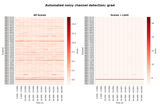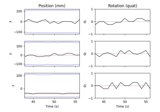mne.epochs.average_movements¶
- mne.epochs.average_movements(epochs, head_pos=None, orig_sfreq=None, picks=None, origin='auto', weight_all=True, int_order=8, ext_order=3, destination=None, ignore_ref=False, return_mapping=False, mag_scale=100.0, verbose=None)[source]¶
Average data using Maxwell filtering, transforming using head positions.
- Parameters
- epochsinstance of
Epochs The epochs to operate on.
- head_pos
array|None If array, movement compensation will be performed. The array should be of shape (N, 10), holding the position parameters as returned by e.g.
read_head_pos.- orig_sfreq
float|None The original sample frequency of the data (that matches the event sample numbers in
epochs.events). Can beNoneif data have not been decimated or resampled.- picks
str|list|slice|None Channels to include. Slices and lists of integers will be interpreted as channel indices. In lists, channel type strings (e.g.,
['meg', 'eeg']) will pick channels of those types, channel name strings (e.g.,['MEG0111', 'MEG2623']will pick the given channels. Can also be the string values “all” to pick all channels, or “data” to pick data channels. None (default) will pick all data channels. Note that channels ininfo['bads']will be included if their names or indices are explicitly provided.- originarray_like, shape (3,) |
str Origin of internal and external multipolar moment space in meters. The default is
'auto', which means(0., 0., 0.)whencoord_frame='meg', and a head-digitization-based origin fit usingfit_sphere_to_headshape()whencoord_frame='head'. If automatic fitting fails (e.g., due to having too few digitization points), consider separately calling the fitting function with different options or specifying the origin manually.- weight_allbool
If True, all channels are weighted by the SSS basis weights. If False, only MEG channels are weighted, other channels receive uniform weight per epoch.
- int_order
int Order of internal component of spherical expansion.
- ext_order
int Order of external component of spherical expansion.
- destination
str| array_like, shape (3,) |None The destination location for the head. Can be
None, which will not change the head position, or a string path to a FIF file containing a MEG device<->head transformation, or a 3-element array giving the coordinates to translate to (with no rotations). For example,destination=(0, 0, 0.04)would translate the bases as--trans defaultwould in MaxFilter™ (i.e., to the default head location).- ignore_refbool
If True, do not include reference channels in compensation. This option should be True for KIT files, since Maxwell filtering with reference channels is not currently supported.
- return_mappingbool
If True, return the mapping matrix.
- mag_scale
float|str The magenetometer scale-factor used to bring the magnetometers to approximately the same order of magnitude as the gradiometers (default 100.), as they have different units (T vs T/m). Can be
'auto'to use the reciprocal of the physical distance between the gradiometer pickup loops (e.g., 0.0168 m yields 59.5 for VectorView).New in version 0.13.
- verbosebool,
str,int, orNone If not None, override default verbose level (see
mne.verbose()and Logging documentation for more). If used, it should be passed as a keyword-argument only.
- epochsinstance of
- Returns
- evokedinstance of
Evoked The averaged epochs.
- evokedinstance of
Notes
The Maxwell filtering version of this algorithm is described in [1], in section V.B “Virtual signals and movement correction”, equations 40-44. For additional validation, see [2].
Regularization has not been added because in testing it appears to decrease dipole localization accuracy relative to using all components. Fine calibration and cross-talk cancellation, however, could be added to this algorithm based on user demand.
New in version 0.11.
References
- 1
Taulu S. and Kajola M. “Presentation of electromagnetic multichannel data: The signal space separation method,” Journal of Applied Physics, vol. 97, pp. 124905 1-10, 2005.
- 2
Wehner DT, Hämäläinen MS, Mody M, Ahlfors SP. “Head movements of children in MEG: Quantification, effects on source estimation, and compensation. NeuroImage 40:541–550, 2008.

